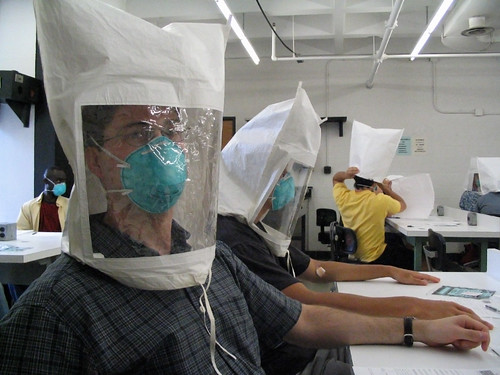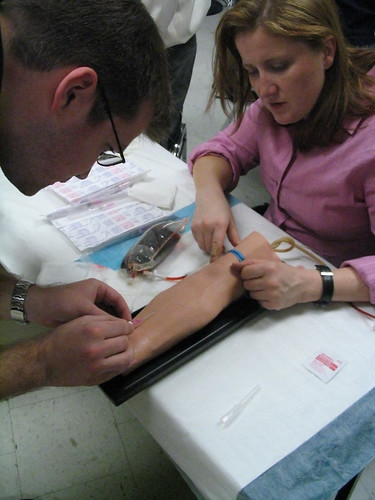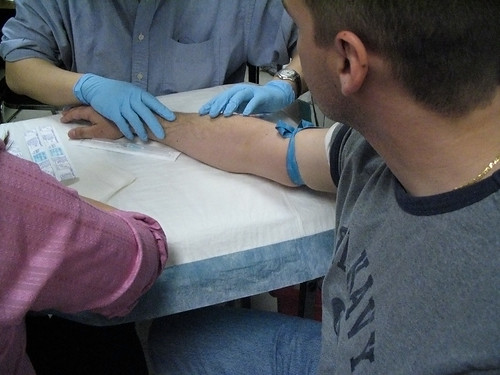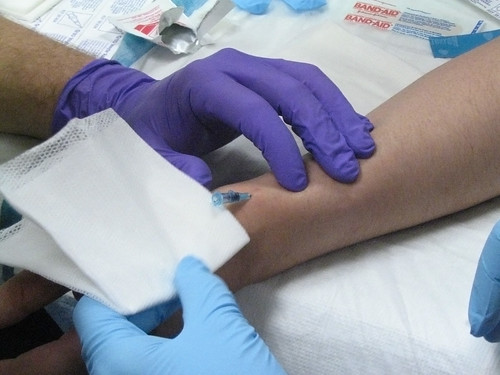Final Count
Pending revisions, the final Thesis Progress Graph:

I thought the trajectory was such that I'd hit 25,000 words with a rather verbose Discussion section, but it was not to be. As theses go, I feel a little self-disgust that this one's a little on the shorter side. Even with references, the volume only comes out to 118 pages. My committee chair mentioned that I also needed to throw in my curriculum vitae. Whoopee! That brings the page total to a WHOPPING 120 pages.
Even though my experience in research (as an undergraduate, a technician, and a graduate student) says otherwise, it's hard to escape the thinking that correlates the quality of one's research career by the quantity of data generated. We're so hung up on quantity these days. More words, more figures, more publications, more grant money equals bigger, badder, and better.
Yet, most people that I know in science understand that research isn't so simple. Experiments fail for any number of reasons: equipment failure, bad reagents, difficult/poor project, bad luck, wrong electron spin. Grad students can go months, perhaps more, generating piles of 'negative data.' Negative data is important, no doubt, but it's kind of like proving the sky isn't chartreuse. It doesn't necessarily move the project forward and gives answers no one really cares about. I knew one graduate student who spent years obtaining negative data on a number of research projects. Despite her lack of success, you couldn't find anyone who would claim that she wasn't a competent scientist. In fact, her committee finally let her go, realizing that she really had nothing more to prove.
I've spent five years in graduate school so far. The first two-and-a-half years I spent with an advisor that couldn't care less about my training. What data I generated with him didn't carry over into my new lab with Barb. What to do? Start from scratch? Generate a quantity of data on the new project that will satisfy even the most hardened critics? More data more time more years trying to prove my worth in science to these people? No, I don't think so. Anyway, my approach to things is that "it" is more about the journey than the destination, and I concluded quite a while ago that staying in graduate school wasn't going to make me any better as a scientist. If science is in my future (which it isn't), there will be other opportunities to continue growth in that area.
Yet I can't shake this feeling of inferiority with the volume of data I've generated. When I took the thesis drafts around to my committee last week, a younger graduate student, "Jess", scoffed at the fact that all five copies fit into one box. As if I should need a truck to deliver these things. Yes, I'm positive "Jess" is the next generation of academic scientist, beating down her own graduate students and lab personnel, sometime in the near future. Whatever. Whatever helps "Jess" sleep at night, she can believe what she wants. She and her ilk are just another reason why I won't be anywhere near academia if I can help it.
So what? I won't be remembered as a Graduate Student All-Star. I'll let people like "Jess" claim that accolade. I'll leave it to someone else to tell her that's almost like winning "Jagoff of the Year", only less prestigious.
What I'm listening to right now: "Alive and Kicking", Simple Minds
I thought the trajectory was such that I'd hit 25,000 words with a rather verbose Discussion section, but it was not to be. As theses go, I feel a little self-disgust that this one's a little on the shorter side. Even with references, the volume only comes out to 118 pages. My committee chair mentioned that I also needed to throw in my curriculum vitae. Whoopee! That brings the page total to a WHOPPING 120 pages.
Even though my experience in research (as an undergraduate, a technician, and a graduate student) says otherwise, it's hard to escape the thinking that correlates the quality of one's research career by the quantity of data generated. We're so hung up on quantity these days. More words, more figures, more publications, more grant money equals bigger, badder, and better.
Yet, most people that I know in science understand that research isn't so simple. Experiments fail for any number of reasons: equipment failure, bad reagents, difficult/poor project, bad luck, wrong electron spin. Grad students can go months, perhaps more, generating piles of 'negative data.' Negative data is important, no doubt, but it's kind of like proving the sky isn't chartreuse. It doesn't necessarily move the project forward and gives answers no one really cares about. I knew one graduate student who spent years obtaining negative data on a number of research projects. Despite her lack of success, you couldn't find anyone who would claim that she wasn't a competent scientist. In fact, her committee finally let her go, realizing that she really had nothing more to prove.
I've spent five years in graduate school so far. The first two-and-a-half years I spent with an advisor that couldn't care less about my training. What data I generated with him didn't carry over into my new lab with Barb. What to do? Start from scratch? Generate a quantity of data on the new project that will satisfy even the most hardened critics? More data more time more years trying to prove my worth in science to these people? No, I don't think so. Anyway, my approach to things is that "it" is more about the journey than the destination, and I concluded quite a while ago that staying in graduate school wasn't going to make me any better as a scientist. If science is in my future (which it isn't), there will be other opportunities to continue growth in that area.
Yet I can't shake this feeling of inferiority with the volume of data I've generated. When I took the thesis drafts around to my committee last week, a younger graduate student, "Jess", scoffed at the fact that all five copies fit into one box. As if I should need a truck to deliver these things. Yes, I'm positive "Jess" is the next generation of academic scientist, beating down her own graduate students and lab personnel, sometime in the near future. Whatever. Whatever helps "Jess" sleep at night, she can believe what she wants. She and her ilk are just another reason why I won't be anywhere near academia if I can help it.
So what? I won't be remembered as a Graduate Student All-Star. I'll let people like "Jess" claim that accolade. I'll leave it to someone else to tell her that's almost like winning "Jagoff of the Year", only less prestigious.
*******
What I'm listening to right now: "Alive and Kicking", Simple Minds




